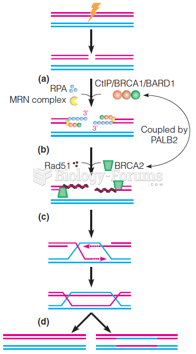|
|
|
Egg cells are about the size of a grain of sand. They are formed inside of a female's ovaries before she is even born.
Giardia is one of the most common intestinal parasites worldwide, and infects up to 20% of the world population, mostly in poorer countries with inadequate sanitation. Infections are most common in children, though chronic Giardia is more common in adults.
When Gabriel Fahrenheit invented the first mercury thermometer, he called "zero degrees" the lowest temperature he was able to attain with a mixture of ice and salt. For the upper point of his scale, he used 96°, which he measured as normal human body temperature (we know it to be 98.6° today because of more accurate thermometers).
Increased intake of vitamin D has been shown to reduce fractures up to 25% in older people.
There are immediate benefits of chiropractic adjustments that are visible via magnetic resonance imaging (MRI). It shows that spinal manipulation therapy is effective in decreasing pain and increasing the gaps between the vertebrae, reducing pressure that leads to pain.
 The metabolic pathway that breaks down phenylalanine and its relationship to certain genetic disease
The metabolic pathway that breaks down phenylalanine and its relationship to certain genetic disease
 Many European Americans are involved in ethnic work, attempting to maintain an identity more precise ...
Many European Americans are involved in ethnic work, attempting to maintain an identity more precise ...





